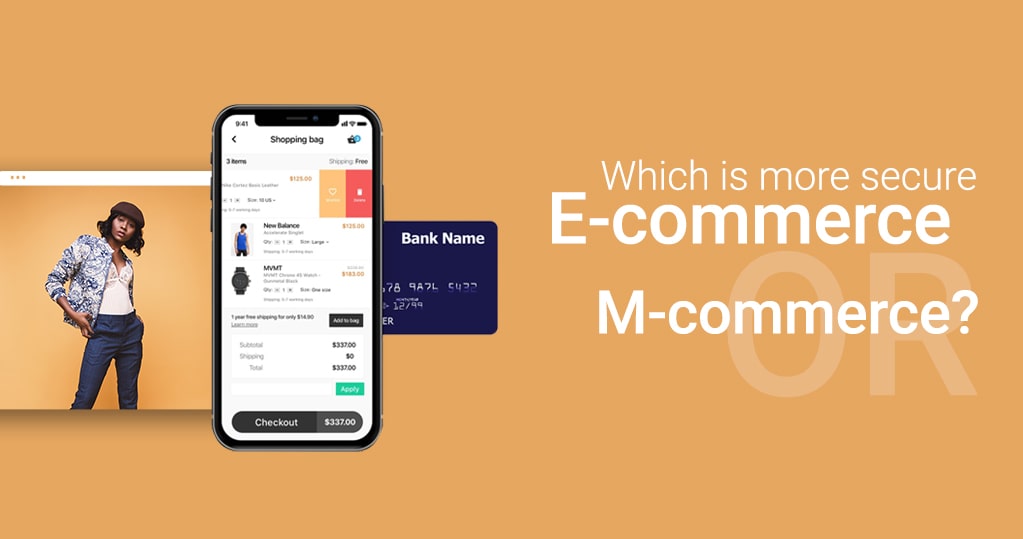Until a few years earlier, speaking about security threats on data and compromised data was big news on the screens. However, today, breaches in data security have become common among millions of people. In the 21st century alone, 3.5 billion people have experienced personal data breaching above many enormous breaches. In March 2020, 538 million accounts of Sina Weibo, a Chinese microblogging website, were breached. It was reported that the usernames, real names, phone numbers, gender, and location of over 172 million users were posted on dark web markets for sale.
Additionally, the passwords were not included, which rightly indicated the reason for data theft. This was only one example from millions of data theft occurring around the globe. However, today, if not all, the majority of the ecommerce and mcommerce industries are securing their services to avoid this theft. Therefore, in this article, we will be discussing the security features in ecommerce and mcommerce and later will conclude on which is equipped with better security features and which is more secure – ecommerce or mcommerce. Keep reading and you’ll not want to stop!
Security Features in Ecommerce
Ecommerce Security is an essential feature for every online selling business in view of the increasing cybercriminals and cyber-attacks. According to Fintech News, between January and April 2020, cloud-based cyber-attacks increased to 630%. Also, in just six weeks, attacks on home-workers skyrocketed five-folds since lockdown.
Ecommerce security implies the guidelines that assure safe transactions done over the internet. It is inclusive of the protocols that secure the people who involve in the process of online selling and purchasing of goods and services. As an online seller, businesses need to gain their customers’ trust by employing the basics of ecommerce security that include Authenticity, Privacy, Integrity, and Non-repudiation.
Although the growth in the ecommerce industry has greatly enhanced the online transaction procedures, it has grabbed the eyes of bad players in the market as well. The stats are quite evident to showcase that it is in the hit list when it comes to cybercrimes. It was reported that above 32% of the cybercrimes attacks were experienced by ecommerce industries. The attacks on ecommerce businesses lead to significant losses with respect to market shares, financials, as well as brand image. Studies proved that small ecommerce businesses who were affected by cybercrime attacks, could not even survive for more than half a year. Due to such reasons, it was more than important to secure ecommerce businesses, than ever before. Here are a few security features that are usually adopted by the majority of the ecommerce businesses to curb the risks of getting attacked by cybercriminals:
SSL Certificate
SSL (Secure Sockets Layer) certificates can be referred to as files that associate a solution to the transactions on different network paths. These certificates are connected with transactions, regular queries, and credit card details. It encrypts data in order to secure it during blocking between various destinations. The information sent from the user to the website is hence secured with an SSL certificate. Ecommerce websites require purchasing this certificate to secure their website and prevent fraudulent activities that may occur on the web. Moreover, in order to facilitate any kind of business on the web, purchasing the SSL certificate is mandatory. When ecommerce businesses use this layer of security, they can get the ownership of their website which will help in counterfeiting phishing done by web hackers.
HTTPS and not HTTP
Utilizing the obsolete HTTP protocol made ecommerce businesses more prone to cyber-attacks. Due to this reason, the majority of the e-businesses have switched to HTTPS that establishes a hallmark of security next to the URL bar on the users’ devices. HTTPS stands for Hypertext Transfer Protocol Secure that not only secures the sensitive information entered by the customers, but also protects the user data. As HTTP is more inclined to become non-existent, websites now show a pop-up notification stating that the website wherein the customers wish to proceed is insecure. In fact, some browsers straightly block users from accessing websites that are insecure.
The websites employing HTTPS are also ranked higher on Google’s Search Engines Results Page (SERP) as HTTPS is one of the ranking factors in Google. Ecommerce businesses, firstly, need to purchase an SSL certificate from a hosting service, before switching to HTTPS. This feature is one of the most important security features in ecommerce.
Anti-malware Software
Many ecommerce websites use anti-malware software in order to stop hackers from stealing credit card information and place fraudulent orders. Such antivirus software uses sophisticated algorithms to mark and alert you of any malicious transactions. The users can determine whether the transaction is genuine with the fraud risk score given by this anti-malware software.
Security Features in Mcommerce
Mobile devices are quite speedily becoming the most preferred channel for commerce as well as banking. The convenience of using mobile smartphones also brings new challenges and threats to it becoming an epicenter of fraudulent activities. Cybercriminals are a step ahead in capturing consumer data and bank details than any other system. Therefore, businesses employing mcommerce services are focusing on securing their services in every possible manner. Multi-level authentication is known for a few decades in the online selling world. It is one of the most commonly used methods to secure online data and is constantly evolving into the mcommerce world wherein more and more transactions are taking place, each day. As mobile phones are more susceptible to be stolen from the owner, it is extremely important to accurately connect only the authorized user with the mobile device. Here are a few most essential features equipped by mcommerce businesses to secure their users’ data and other services offered:
User Identification
Ecommerce businesses are anonymous in nature with both the customers as well as the sellers not knowing each other. Until a customer voluntarily registers with the business and provide personal and payment details, the businesses are most probably not identifying the shoppers who browse through their website. Although there are many extensive technologies that let businesses get the location and other shopping preferences, the personal details are not disclosed until done by the customer. Apart from knowing the whereabouts of the customers, mcommerce applications let businesses collect information such as user identity. Since customers are mostly spending their time on their smartphones and trusting mobile apps over web applications, mcommerce is securing the user identification processes in various ways.
Security of Data
Generally, the payment data is pre-loaded in a consumer’s mobile phone application prior to making a purchase. However, it is only accessed when the consumer unlocks the phone and the application and enters the security number that is a one-time password, user name, and most importantly, ecommerce businesses use additional features such as biometrics wherein the customers’ unique fingerprints, face detection, and retina detection is used to facilitate a transaction, which is not possible when using ecommerce. Moreover, to fulfill the payment procedure, the customer needs to make an online payment using personal wallets and UPI apps that is accessible only using biometrics of the owner of the phone or a strong password. All these features are provided to secure the transactions done using a mobile phone.
Which is more secure?
Now that we have seen the security features of both ecommerce a mcommerce, it is time that we answer the primary question – Which is more secure, ecommerce or mcommerce? It might be surprising for you at first, but, the answer is, mcommerce is more secure than ecommerce. Yes, we will be answering to the next obvious question in your mind – how? While ecommerce ensures their users with general security practices such as two-factor authentication, one-time password, and multiple stages of authenticity, mcommerce websites offer an advanced security feature – biometric authentication. The additional security feature is what helped us decide the winner of the competition.
Conclusion
As the world is more and more inclining towards convenience, the topic of choosing mcommerce over ecommerce is quite relevant. The advantages of using mcommerce already surpass that of ecommerce. Mcommerce was invented and used to stay for generations, indeed. If you are planning to enter the ecommerce bandwagon, do not forget to look after its successor – mcommerce. If in doubt, for knowing the process to have the best of both – the ecommerce world as well as the mcommerce world, check out builderfly.com. You’ll get a complete solution to go selling online with the best use of both, ecommerce and mcommerce.








